The Covid-19 labour crisis and its impact on women workers
March 11, 2021
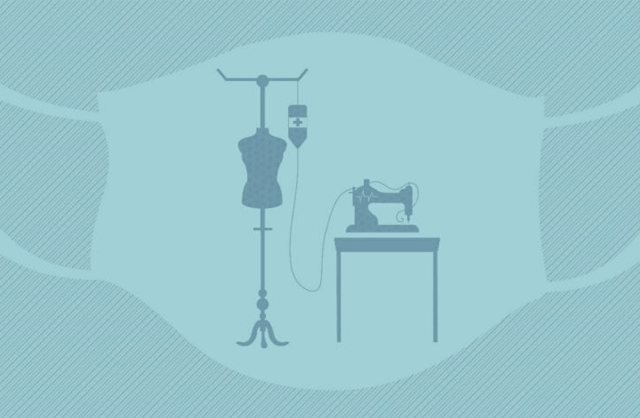
Results of the ‘Improved productivity through better labour legislation in North Macedonia’ Project
“Globally, women will likely experience a significant burden on their time given their multiple care responsibilities as school closures and confinement measures are adopted, possibly leading to reductions in working time and permanent exit from the labour market. In some contexts, and due to food insecurity, girls and women would decrease their caloric intake in favour of men and boys.”
World Bank Group (2020). Gender dimensions of the COVID-19 pandemic.
Workers worldwide were among the first ones to be hit after states of emergency were declared. This is because they had to directly deal with the coronavirus as frontline workers or were affected by consequences that exposed them to mass layoffs and gross violations of labour rights. For most workers in North Macedonia, the crisis meant a struggle to preserve their own health and the health of their loved ones, but also a struggle to save their existence. Immediately after the beginning of the pandemic and throughout the year, the Helsinki Committee registered an unprecedented number of 395 cases of labour rights violations that concerned at least 3368 workers. More than 80% of all cases involve female workers, which illustrates the gender dimension of this crisis.
‘Improved productivity through better labour legislation in North Macedonia’ ProjectThis aspect is defined by the circumstances that women are more common to work in sectors affected by the crisis, such as catering, clothing, textile, footwear stores, hairdressers and beauty salons. Furthermore, it is important to note that women are more often employed with a fixed-term contract than men, so due to COVID-19 their contracts were generally not extended by the employers and they were left with no protective mechanisms. The underlying reasons behind these consequences point to the exact incentive why the Helsinki Committee started intensively working in this field since 2018, and that is what started the cooperation with the Good Governance Fund (GGF). The ‘Improved productivity through better labour legislation in North Macedonia’ Project was funded by the UK Government with the support of the British Embassy Skopje from August 2018 to March 2019, and it was then extended for two more years until the end of March 2021.
At the point of writing of the project proposal, the EU Country report for 2018 stated that “Structural problems of the labour market are reflected in low activity and high unemployment rates.” and that “The economy still suffers from weaknesses in education curricula, low innovation rates and important investment gaps”. In addition to that, it was a challenging task to initially find a specific angle to operate in a country whose economy traditionally ranks among the ones with the highest rates of unemployment in Europe, which in June 2018 was at 21,6%. Nevertheless, constant reports from workers regarding access to employment, salaries below the minimum wage, inappropriate labour legislation and dangerous working conditions, as well as the change in political context which showed openness for cooperation between state institutions and the civil sector, provided an opportunity for a labour legislation reform period.
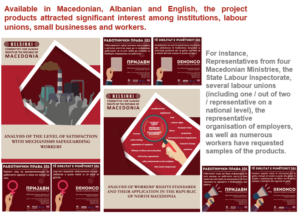
Some of the products that were produced within the Project. Design by Sofija Hristova
Consequently, the project purpose was to enhance workers’ productivity and create new jobs by improving labour legislation and vitalising mechanisms for protection of labour rights, and it was mostly inspired by the country’s inactivity rate of 43%. Out of this number of inactive persons, which is comprised of people who are not able to work or are not looking for a job, 35.4% were men and 64.6% women. These findings, coupled with information on weak contract enforcement and large informal economy, structural problems of the labour market reflected in low activity and general weaknesses in education curricula, low innovation rates and important investment gaps including, in particular, the public infrastructure, were the starting point of the project activities.
Hence, the project team immediately started intensive workers’ rights campaigns, coordination with institutions, labour unions and organisations of employers, and aimed to position the topic in the centre of public discourse. High unemployment rates, fundamental problems in the economy and general distrust in the institutions and the rule of law, put the workers in a position where they rarely utilized the legal remedies available in cases of violations of their rights at the workplace. Considering that the analytical picture of labour in the country shows that the main share of employees is in the processing industry sector – around one fifth of all employees, with salaries around or below the average, for many of them access to justice in this field was not a viable option. More to the point, a very small percentage of the workers were aware of the protective mechanisms that they could use, such as the State Labour Inspectorate (SLI).
An analysis conducted by the Helsinki Committee manifested that 82.60% of the respondents reported that their labour rights, or the rights of their close ones, were endangered at some point, but only 22.29% of them stated that they have used the institutional mechanisms for protection of these rights. Furthermore, the Law on Labour Relations, which is a systemic law that sets the general framework of all labour related issues, has been amended 35 times and many of its provisions remain ambiguous and unclear, which adds to the uncertainty of workers’ protection.
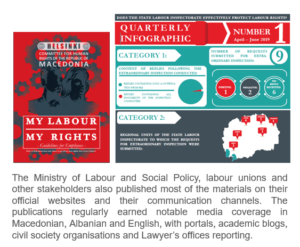
The project established cooperation between stakeholders. Design by Zoran Kardula
Two and a half years later, the project team can proudly inform that legal aid was provided in 605 cases of violation of labour rights, access to employment and/or protection of these rights in front of the competent institutions and that the cases benefited at least 11.732 workers. During the same period, legal counselling was also provided to 3341 employees from the garment industry who work in different textile, leather or shoe factories throughout 11 cities in the country, all of which points to a positive trend that workers are significantly getting more familiar with the protective mechanisms, especially with regards to the SLI. Furthermore, issues regarding workers’ rights are much more frequently covered by popular media and the number of reports is consistently rising.
In addition to that, the official numbers on the country claim that the unemployment rate as of December 2020 is at 16,5% and the EU country reports for 2019 and 2020 clearly note that “North Macedonia has made some progress and is moderately prepared to cope with competitive pressures and market forces within the EU. […].”, adding to the positive developments in the last two years.
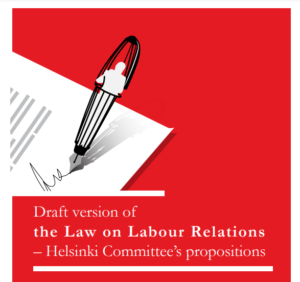
The project team consistently informed the general public. Design by Zoran Kardula
The productive cooperation between stakeholders was to be crowned with the adoption of a new Labour Bill by the end of last year, but due to postponements caused by COVID-19, the Bill is expected to enter the parliamentary procedure in late March 2021. The Helsinki Committee is part of the working group that is devoted to the drafting of the new Labour Bill from the very beginning, and most of the Committee’s amendments were incorporated into the draft version so far.
The COVID-19 labour crisis
Nonetheless, the unusual circumstances that originated from the COVID-19 pandemic, caused global effects on an incomparable scale. The fast-growing health crisis, which hit almost every country in the world including North Macedonia, lead to enormous economic and social consequences, from which we are yet to recover. Ergo, the Project team was consistently in communication with the institutions, the Labour unions, the Business Confederation of Macedonia (BKM) and the Organization of Employers of Macedonia (ORM) with regards to the proposed measures during the COVID-19 national crisis and the organization remained fully available for any free legal consultations and/or legal aid.
The team’s most significant contribution in this regard was during the involvement in the creation and adoption of the third set of economic measures aimed to provide relief in the aftermath of the crisis. Due to the efforts of the team, more than 8000 workers who were unjustly fired or falsely agreed to leave their jobs during the pandemic received financial coverage from the Agency for employment for two months under the widened provision that included this group of workers too, who were previously excepted from the law.
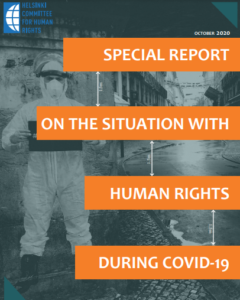
The Committee closely follows the COVID-19 developments. Design: Agnesa Sarachini
That being said, gender gaps in outcomes across access to employment, salaries and economic opportunity continue to exist in North Macedonia. The COVID-19 pandemic amplified those pre-existing gender differences and we have to keep these differentiations in sight to produce a more effective response and action. In conclusion, it is undeniable that a lot remains to be done before the country can establish a functioning labour legislation protecting the workers’ rights and subsequently increasing their productivity at the workplace. However, it is also visible that the topic is set in motion and that it is our responsibility to organise and upkeep the positive trends in order to materialise the much-needed changes.
Note: British Embassy Skopje offers its blog platform for guest posts. The views expressed in the guest posts are those of the authors.


